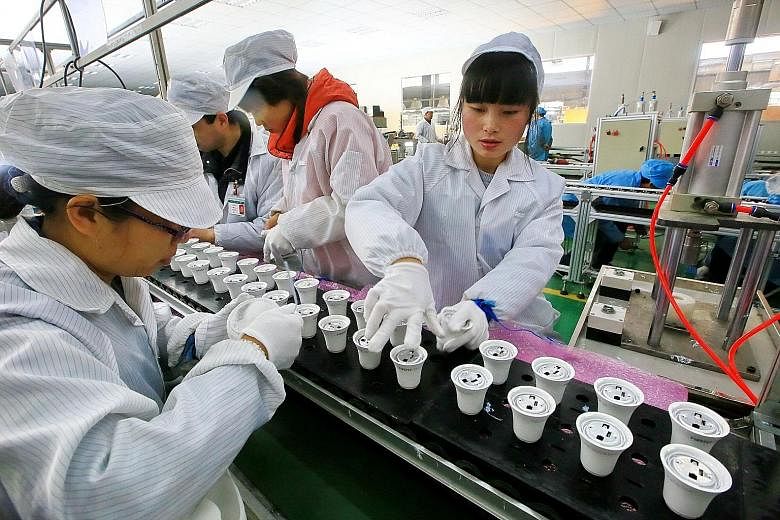BEIJING • Prices for goods at the factory gate in China jumped last month, Beijing said yesterday, in a positive sign of strengthening demand for the world's second- largest economy.
The producer price index (PPI) rose 7.6 per cent year on year in March, according to the National Bureau of Statistics.
Factory gate inflation "has eased", NBS analyst Sheng Guoqing said in a statement, noting that last month's figure fell back from a 7.8 per cent increase in February after five months of expansion.
The February figures reflected the fastest increase since September 2008, raising hopes that the pick-up in prices could trickle down to other economies.
For years, the world economy has been mired in tepid inflation or deflation which, if persistent, tends to be bad for industrial prospects and economic growth because customers delay purchases in the hope of getting cheaper deals in the future, starving companies of business and funds.
China's economy, a vital engine of global growth, expanded 6.7 per cent last year, the slowest rate in a quarter of a century. But a slight uptick in the last three months of 2016 provided signs of stabilisation.
Mr Dariusz Kowalczyk at Credit Agricole told Bloomberg News that the upward trend in the prices for goods at the factory gate is a positive signal.
"It looks like there is a lot of inflation momentum at the producer level, which is good because they will have higher profits and more money to invest," he said.
But Mr Julian Evans-Pritchard of Capital Economics said that the coming months will likely see a decrease in producer price inflation as base effects become "less favourable" and economic activity begins to cool on the back of a tighter policy stance. "Those anticipating a further reflation in China are likely to be disappointed," he said.
Yesterday's reading follows data showing a further expansion in factory activity driven by a pick-up in production and demand last month, while economic growth came in slightly better than expected at the end of last year.
Beijing has said it wants to reorient the economy away from relying on debt-fuelled investment and towards a consumer-driven model, but the transition has proven challenging, leading to the slower growth readings in recent years.
The consumer price index, a key gauge of retail inflation, rose 0.9 per cent last month, the data showed, compared with a 0.8 per cent increase in February.
NBS' Mr Sheng said the figures were affected by a drop in food prices, while prices for medical care, housing, education and entertainment, and transport and communication have increased.
Mr Zhao Yang of Nomura said in a note that the consumer price inflation cap is expected to rise in the coming months because of "pass-through from high property prices and the high PPI".
AGENCE FRANCE-PRESSE

